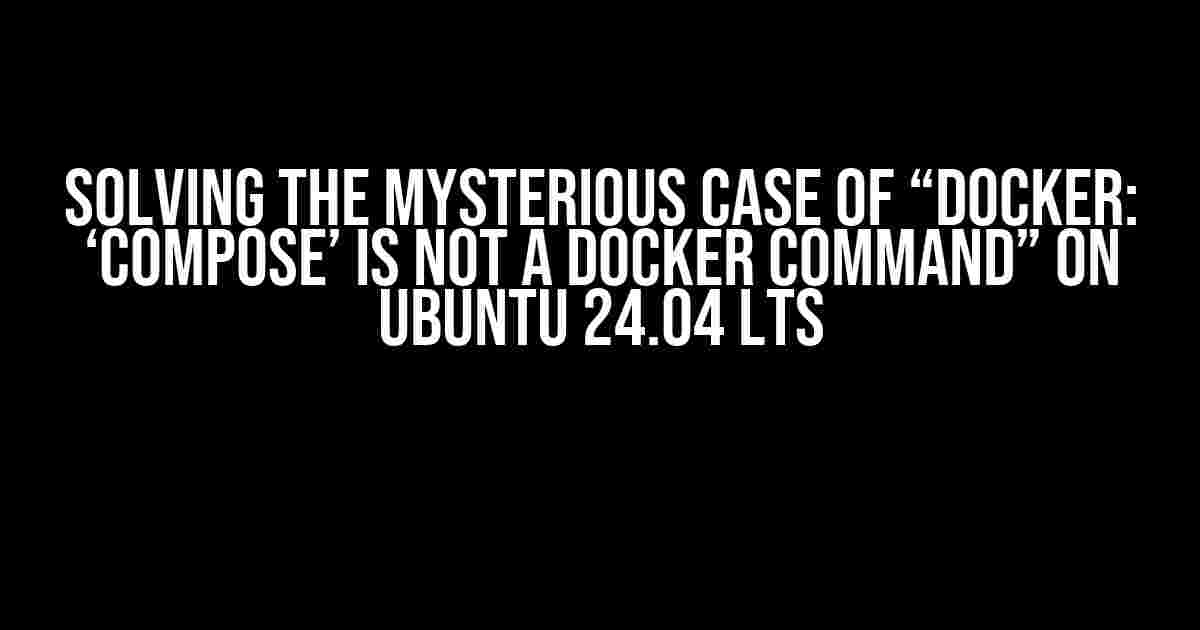If you’re reading this, chances are you’ve stumbled upon the frustrating error message “docker: ‘compose’ is not a docker command” on your Ubuntu 24.04 LTS system. Don’t worry, you’re not alone! This pesky issue has been plaguing Docker enthusiasts for a while now. But fear not, dear reader, for we’re about to embark on a thrilling adventure to solve this mystery and get your Docker Compose up and running in no time!
What’s Going On?
Before we dive into the solution, let’s quickly understand what’s causing this error. The issue arises because Docker Compose is not a built-in Docker command on Ubuntu 24.04 LTS. Instead, it’s a separate tool that needs to be installed and configured correctly. Think of Docker Compose as a specialized chef who helps you manage multiple containers with ease, but it’s not part of the main Docker kitchen utensils.
Stepping into the World of Docker Compose
Now that we know the problem, let’s get started with the solution! To fix the “docker: ‘compose’ is not a docker command” error, we’ll need to install Docker Compose on our Ubuntu 24.04 LTS system. Follow these simple steps to get started:
sudo apt update– Update your package list to ensure you have the latest package information.sudo apt install docker-compose– Install Docker Compose using the apt package manager.
That’s it! You’ve successfully installed Docker Compose on your Ubuntu 24.04 LTS system. But wait, there’s more! To verify the installation, run the following command:
docker-compose --versionThis should display the version of Docker Compose installed on your system. If you see an error message instead, don’t panic! Just ensure that you’ve installed Docker Compose correctly and try again.
Configuring Docker Compose
Now that we have Docker Compose installed, let’s configure it to work with our Docker setup. By default, Docker Compose looks for a file named docker-compose.yml in the current directory. This file contains the configuration for our containers and services. Let’s create a simple example to get started:
version: '3'
services:
web:
image: nginx:latest
ports:
- "80:80"
volumes:
- ./html:/usr/share/nginx/html
In this example, we’re defining a service named “web” that uses the latest Nginx image, maps port 80 on the host machine to port 80 in the container, and mounts a volume for serving HTML files.
Running Docker Compose
With our configuration file in place, it’s time to run Docker Compose! Navigate to the directory containing your docker-compose.yml file and execute the following command:
docker-compose up -dThis will start our “web” service in detached mode (-d flag). You can verify that the container is running by executing:
docker-compose psThis command will display the status of our containers. Since we’re running Nginx, you can access your HTML files by visiting http://localhost:80 in your web browser.
Troubleshooting Common Issues
As you venture deeper into the world of Docker Compose, you might encounter some common issues. Don’t worry, we’ve got you covered! Here are some troubleshooting tips to keep in mind:
- Permission Issues: If you encounter permission errors while running Docker Compose, try executing the command with sudo:
sudo docker-compose up -d. - Container Not Found: If Docker Compose can’t find your container, ensure that you’re in the correct directory containing the
docker-compose.ymlfile. - Composition File Errors: If your composition file contains errors, Docker Compose will fail to start. Verify that your YAML file is correctly formatted and free of syntax errors.
Conclusion
Voilà! We’ve successfully solved the “docker: ‘compose’ is not a docker command” mystery on Ubuntu 24.04 LTS. With Docker Compose installed and configured, you’re now ready to take your containerization skills to the next level. Remember, practice makes perfect, so don’t be afraid to experiment and explore the vast possibilities of Docker Compose.
| Command | Description |
|---|---|
docker-compose --version |
Displays the version of Docker Compose installed on your system. |
docker-compose up -d |
Starts the Docker Compose service in detached mode. |
docker-compose ps |
Displays the status of your Docker Compose containers. |
Happy containerizing, and remember: with great power comes great responsibility!
Additional Resources
If you’re new to Docker or Docker Compose, here are some additional resources to help you on your journey:
- Docker Official Documentation: https://docs.docker.com/
- Docker Compose Official Documentation: https://docs.docker.com/compose/
- Ubuntu Docker Installation Guide: https://docs.docker.com/engine/install/ubuntu/
Stay curious, and keep exploring the world of containers!
Frequently Asked Question
Having trouble with Docker Compose on Ubuntu 24.04 LTS? Don’t worry, we’ve got you covered! Check out these FAQs to get your Docker Compose up and running in no time.
What does the error message “docker: ‘compose’ is not a docker command” mean?
This error message typically indicates that Docker Compose is not installed or not properly configured on your Ubuntu 24.04 LTS system. It’s not a part of the standard Docker installation, so you need to install it separately.
How do I install Docker Compose on Ubuntu 24.04 LTS?
You can install Docker Compose using pip, the Python package manager. Run the following command in your terminal: pip3 install docker-compose. Alternatively, you can also use the package manager to install it: sudo apt-get install docker-compose.
Why do I get a “Permission Denied” error when trying to run Docker Compose?
This error usually occurs because Docker Compose requires root privileges to function. You can resolve this by running the command with sudo: sudo docker-compose up -d. Alternatively, you can also add your user to the Docker group to avoid using sudo every time.
What is the difference between Docker and Docker Compose?
Docker is a containerization platform that allows you to run containers. Docker Compose, on the other hand, is a tool for defining and running multi-container Docker applications. It provides a convenient way to manage and orchestrate multiple containers for your application.
Can I use Docker Compose with other Linux distributions?
Yes, Docker Compose is not exclusive to Ubuntu 24.04 LTS. It can be used with other Linux distributions, including CentOS, Fedora, Debian, and more, as long as Docker is installed and running on the system.

